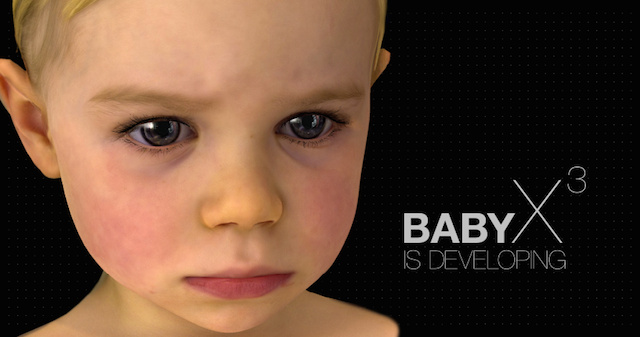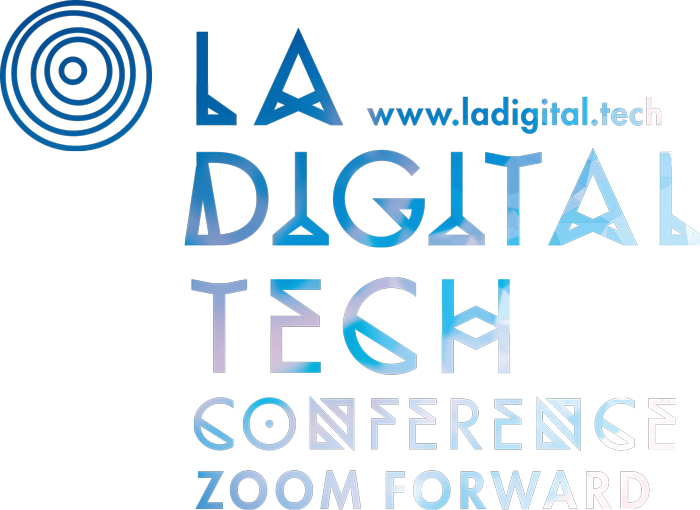Beyond all the technical and algorithmic issues related to artificial intelligence, the early stages of this approaching paradigm raise a host of social questions. A look back at a day full of reflection.
Psychology, or the role of emotions
When the machine surprises and moves us
For the field of psychology – and even sociology – artificial intelligence is fertile
ground that, by all accounts, is still relatively preserved.
With the latest advances, particularly in terms of design, the “wow” factor quickly hit the audience with the presentation of Baby X, an experimental program capable of learning and reproducing words and expressions, featuring the visual appearance of a 3 or 4 year-old child. Two notions that seemcontradictory, but which transform our screen into a mirror onto the nostalgic, illusory memory of our very own childhoods.

On this topic, Gaspard Breton from Dynamixyz evoked the Uncanny Valley, theorized by Masahiro Mori, according to which the more a robot or animated representation resembles a human being, the more its flaws appear hideous and remove us from any possible comparison.
The Watson project, an IBM research project led by John R. Smith, aimed to show that it was possible to systematize the creation of a horror film trailer.
Here again, the question comes down to a calculation of emotions: by using three main feelings (surprise, tension, fear) as a basis, it is mechanically possible to build an effective trailer that is true to human creativity.
A revolution in content via AI?
Admittedly, however, there are two opposing camps, as demonstrated during the various battles: for some, it is not possible to reinvent the rules of screenwriting, nor new structures of entertainment. Admittedly, AI brings value to creation, to the communication of the final product as well as to the mechanism itself. It changes users’ experience through a more natural interaction (Manuel Bedouet cites the example of a backpack in an adventure game, whose contents would have been accessible a few years ago via a menu but can now be accessed by moving a hand behind the character’s back). In themselves, the arguments in favor show an improvement in productivity but not in content: technology participates only tacitly in the creative process.
Once the “wow” factor had passed, a series of questions arose regarding the way in which we can use these technologies and the space we will need to make for artificial intelligence in the coming years.
Philosophy, or the role of Mankind in choosing his destiny
As Cyrille Chaudoit magnificently demonstrated in his keynote, the role in our societies for artificial intelligence, and more broadly for new technologies, raises questions about the place of mankind in the hierarchy of life’s different components. It highlights a whole set of contradictions that go well beyond the mere confrontation of man versus machine.
AI also raises the question of trans-humanism: are we ready and willing to use technology to dispense with death and chance? To reconsider everything we know about genetic diversity and human evolution?
Do we want to entrust our destiny to a Deus Ex Machina capable of finding solutions to our purely human, existential problems through the use of logic? Is this what we really want – we who, ourselves, are unable to advance the human cause and condition?
The first experiments conducted by Microsoft and its robot Tay were less than encouraging, as “he” became racist, anti-Semitic and sexist in under 24 hours.
The most recent ongoing projects also raise the issue of Nature versus Technology, thus mimicking the myth of Prometheus. Observing that the gods had provided Man with no means to hunt or defend himself, he stole the sacred fire from them and gifted it to the inhabitants of Earth. Likewise, the speaker recalled that the appropriation of a new tool through progress implies its creation, as well as the permanent elevation of Man to the level of the tool.

Ethics, or remaining master of the value judgment
Early thoughts dating back to the 1940s
The dilemma of the tramway is one of the founding theories for every question that relates to the place of robots in society. Suppose five people find themselves on the tracks of a tram racing towards them, and you have the ability to divert the tram onto a secondary track on which there is only one person. Do you choose, in the available time, to divert the tram? Is your choice based on the value of a human life, in which you tell yourself that one life is worth less than five? If so, by how much? The results show that guinea pigs subjected to this impossible choice opt for fatality, and prefer to not act at all in this situation.
These ethical considerations are not unlike the laws of robotics expounded upon by Isaac Azimov. But if we make a robot autonomous, endowed with something akin to human thought, can we consider it to have human responsibility and is therefore subject to justice, or is it still considered to be a mere tool?
Man’s responsibility over machine
The responsibility of the Tesla Motors company was also raised during the battle, as there has already been a death caused by one if its driverless vehicles. But how many deaths occur in road accidents every day? Using these principles as a starting point, how do we teach machines emotions, empathy and – why not – love, as well as where to place the cursor in the event of an accident? Does the designer’s level of responsibility diminish as the number of intermediaries increases?
Like a knife that wounds or helps prepare a meal, artificial intelligence is a science with vast applications, whose ins and outs are only beginning to be understood. Surprisingly creative or a plagiarist incapable of invention, a weapon of war or a powerful remedy against cancer – it is up to us and our decisions of a quasi-political nature to channel this Deus Ex Machina that has been assembled from scratch by Man.
Sources: JC Monot / TV Rennes / 20 Minutes / Royal Museums of Fine Arts of Belgium



